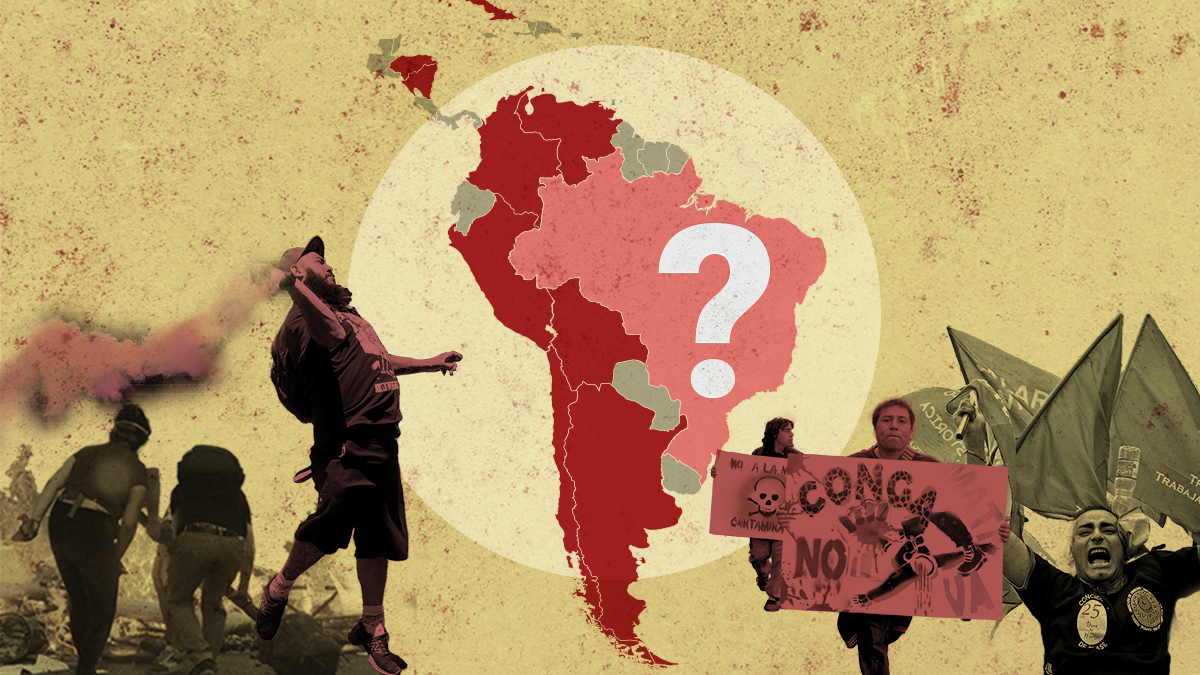August 10, 2022
Since it’s August we obviously can’t ask much of you, but try this for fun: take out a red marker and a black and white map of Latin America.
Now, color in all the countries currently led by leftist leaders. You’ll immediately be filling in five of the largest economies — Argentina, Chile, Colombia, Mexico, and Perú. By October, you’ll likely have added Brazil, the biggest of them all.
Along with stalwart leftists in Bolivia, Venezuela, Nicaragua, Cuba, and the new presidenta of Honduras, your map will have a big splash of rojo/vermelho bigger than any we’ve seen in at least 15 years. That’s when observers first hailed — or feared — a new “pink tide” in Latin America.
But is the region really back in the red, so to speak? Or is this pink tide different from previous ones? Spoiler: they are not the same. Let’s look at what’s going on.
“This is not so much a movement of voters towards the left,” says Chris Garman, managing director for the Americas at Eurasia Group. “This is a movement of voters who are angry with the status quo, and the left is in a position to capitalize on that anger.”
Voter frustrations have been running high for years in Latin America, no matter who is in power. The massive growth of a new middle class in the 2000s sparked hard-to-meet expectations about better public services and cleaner government. Disgruntlement rose. By 2021, region-wide pollster Latinobarómetro found just 27% of those surveyed had confidence in their governments — a 20-point drop from a decade earlier.
Across the region, incumbents — many of them part of the initial pink wave — paid the price. Argentines, Chileans, and Brazilians, for example, all voted in center-right or right-wing successors. In Mexico, meanwhile, voters chose left-wing nationalist AMLO as a rebuke to the center-right establishment.
Then the pandemic hit. Incomes and economies plummeted, millions were threatened anew with poverty, and massive protests over inequality rippled across the region.
Left-wing opposition figures were in the right place at the right time, given their traditional message of tackling income inequality, and the pendulum swung again.
This time, left-wing leaders took power from right-wing incumbents in Argentina (again), Chile (again), and — for the first time — even Colombia.
In Brazil, meanwhile, left-wing former President Luiz Inácio Lula da Silva looks set to trounce the current far-right leader, Jair Bolsonaro, in October. In other words, the latest swing to the left is less “workers of the world unite” and more “throw the bums out!”
But these leaders are going to have a much harder time than left-wingers of the past. For one thing, today’s leaders can only dream of the economic situation that prevailed in the 2000s. Prices for the region’s commodities then were booming, China’s economy was roaring, and low-interest rates in the US were flooding the region with investor cash. With so much money in the pot, it was easy to unveil huge new social spending programs, like those Lula used to lift tens of millions of people out of poverty in Brazil.
Today things look very different. Although post-pandemic supply chain problems and the war in Ukraine have driven up prices for Latin America’s fossil fuels and agriculture commodities, inflation is still crushing household incomes. China’s economy is suffering a case of “slovid” (stunted growth amid COVID restrictions), while the US is raising interest rates and flirting with a recession. In other words, today’s left-wing leaders will have far less cash than their predecessors.
They’ll also have a lot less goodwill from their voters. As my fellow Signalista Willis Sparks put it, “anti-incumbency is great ... until you’re the incumbent."
With frustrations running high and cash running thin, the new generation of left-wing leaders will be on a short leash. You can already see that in Chile, where Gabriel Boric’s approval rating has plummeted since he took office; in Peru, where Pedro Castillo is about to be pushed from power altogether; and in Colombia, where experts say Gustavo Petro has mere months to prove his bonafides to an electorate impatient for change.
“We’re living in an era of extremely short honeymoon periods,” says Garman. With fickle voters, sparser finances, and a tougher economic situation overall, the new red tide could wash out just as fast as it rolled in.
Could that mean it’ll be colorín colorado (game over) for the region’s new pink tide before long?
More For You
Ukraine's President Volodymyr Zelenskiy, Finland's President Alexander Stubb, Estonia’s Prime Minister, President of the European Commission Ursula von der Leyen and other European leaders visit memorial to fallen Ukrainian defenders at the Independent Square on the fourth anniversary of Russia's full-scale invasion, in Kyiv, Ukraine February 24, 2026.
Ukrainian Presidential Press Service/Handout via REUTERS
Somewhere in the Donbas region, Ukrainian soldier Artem Bondarenko says he hasn’t slept through the night in months as he defends Eastern Ukraine.
Most Popular
Members of the special units of the National Guard and the Secretaria de Seguridad Ciudadana stand guard in front of the Fiscalia General de la Republica, where the investigation into the operation in which Nemesio Oseguera Cervantes, alias "El Mencho", founder and leading head of the Cartel de Jalisco Nueva, was killed, is underway.
Félix Márquez/dpa via Reuters Connect
- YouTube
In this Quick Take, Ian Bremmer warns that US military strikes on Iran are “looking increasingly imminent” as diplomacy appears to stall.
© 2025 GZERO Media. All Rights Reserved | A Eurasia Group media company.
